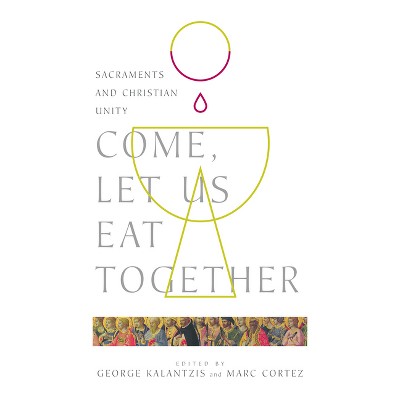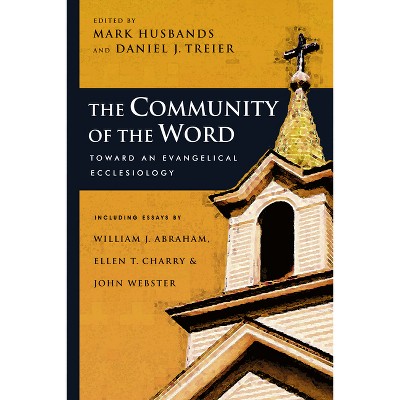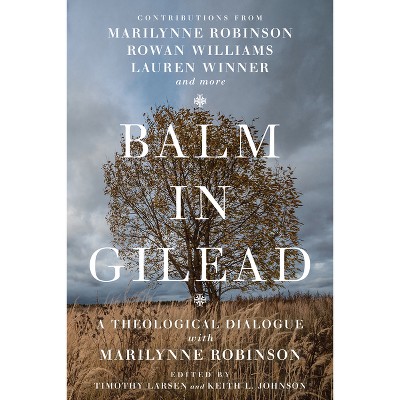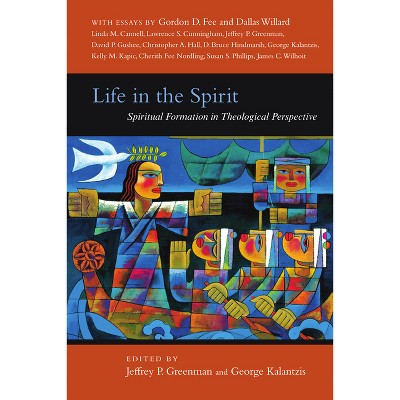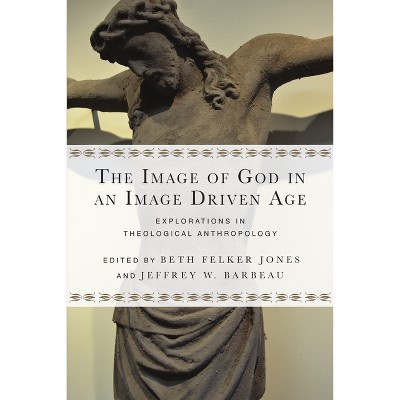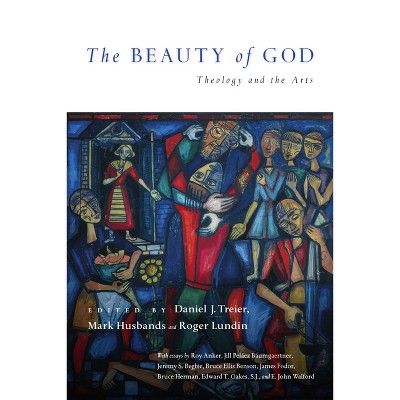The People's Book - (Wheaton Theology Conference) by Jennifer Powell McNutt & David Lauber (Paperback)

About this item
Highlights
- The Bible played a vital role in the lives, theology, and practice of the Protestant Reformers.
- About the Author: David Lauber (PhD, Princeton Theological Seminary) is associate professor of theology at Wheaton College.
- 250 Pages
- Religion + Beliefs, Christian Church
- Series Name: Wheaton Theology Conference
Description
About the Book
These essays from the 2016 Wheaton Theology Conference bring together the reflections of church on the nature of the Bible as "the people's book," considering themes such as access to Scripture and the Bible's role in worship.
Book Synopsis
The Bible played a vital role in the lives, theology, and practice of the Protestant Reformers. These essays from the 2016 Wheaton Theology Conference bring together the reflections of church historians and theologians on the nature of the Bible as "the people's book," considering themes such as access to Scripture, the Bible's role in worship, and theological interpretation.
Review Quotes
"Sola Scriptura, 'Scripture alone': these words still resonate over the centuries since the early 1500s. No single scholar can do justice to the complex history of the Bible and its impact in the Reformation era. Fortunately, Jennifer Powell McNutt and David Lauber have assembled a top-notch team to provide a rich feast of insights on the Bible in the Reformation era and beyond. From regional studies to carefully crafted reflections on the Bible and authority or worship, this book offers timely guidance for all who want to understand the roots of Protestant engagement with Scripture."
"Sola Scriptura, 'Scripture alone': these words still resonate over the centuries since the early 1500s. No single scholar can do justice to the complex history of the Bible and its impact in the Reformation era. Fortunately, Jennifer Powell McNutt and David Lauber have assembled a top-notch team to provide a rich feast of insights on the Bible in the Reformation era and beyond. From regional studies to carefully crafted reflections on the Bible and authority or worship, this book offers timely guidance for all who want to understand the roots of Protestant engagement with Scripture."
--Karin Maag, Meeter Center, Calvin College, Grand Rapids, MI"The People's Book provides a learned, engaging, and wide-ranging treatment of how 'that most precious jewel, ' the Bible, became the treasured possession of the European faithful as never before. Comprised of essays by leading historians and theologians, the volume explores with great subtlety and care the complex story of how Scripture inspired Christians from all walks of life and from all of the competing confessions to reform the church and society of their day, and how it continues to do so in our own. The People's Book makes a welcome and significant contribution to our understanding of the Reformation and its legacy."
"The People's Book provides a learned, engaging, and wide-ranging treatment of how 'that most precious jewel, ' the Bible, became the treasured possession of the European faithful as never before. Comprised of essays by leading historians and theologians, the volume explores with great subtlety and care the complex story of how Scripture inspired Christians from all walks of life and from all of the competing confessions to reform the church and society of their day, and how it continues to do so in our own. The People's Book makes a welcome and significant contribution to our understanding of the Reformation and its legacy."
--Ronald K. Rittgers, Erich Markel Chair of German Reformation Studies, professor of history and theology, Valparaiso University"Despite what Protestants used to say, medieval Christians did have access to the contents of the Bible. Still, the Protestant Reformation gave them far greater access. It also placed biblical doctrine much closer to the center of the faith and spirituality of many Europeans, both Protestant and Catholic. The People's Book deftly explains how this transformation occurred--without oversimplification or Protestant triumphalism. Anyone interested in the legacy of the biblical reforms of Luther, Calvin, and their colleagues will find in these essays a treasure trove of scholarship and practical Christian wisdom."
--Douglas A. Sweeney, professor of church history and the history of Christian thought, Trinity Evangelical Divinity School"Despite what Protestants used to say, medieval Christians did have access to the contents of the Bible. Still, the Protestant Reformation gave them far greater access. It also placed biblical doctrine much closer to the center of the faith and spirituality of many Europeans, both Protestant and Catholic. The People's Book deftly explains how this transformation occurred-without oversimplification or Protestant triumphalism. Anyone interested in the legacy of the biblical reforms of Luther, Calvin, and their colleagues will find in these essays a treasure trove of scholarship and practical Christian wisdom."
"Students of the Reformation will welcome this scholarly, diverse collection."
"Students of the Reformation will welcome this scholarly, diverse collection."
--Publishers Weekly, March 6, 2017"The Reformation was about the Word, but it was also about words-the words of the Bible especially, which in turn resounded through countless sermons, hymns, commentaries, catechisms, debates, dialogues, and public acts. The words of Scripture were not merely script or print, but event, just as the Reformation was not simply a happening, but a shattering. The essays in this volume tell that story with verve and nuance and thus help us to understand why, five hundred years later, the Reformation is still so consequential."
"The 500th anniversary of the Protestant Reformation has witnessed an avalanche of new material, and this edited work is a welcome addition to the subject."
"The 500th anniversary of the Protestant Reformation has witnessed an avalanche of new material, and this edited work is a welcome addition to the subject."
--M. S. Hill, Choice Connect"This collection demonstrates why the Bible and the Reformation remains an important area of study. The People's Book illustrates how the Bible both deserved and undercut that moniker--from Protestant Latin Bibles, to struggles to create truly vernacular Bibles, to the development of the sola scriptura theory. The fine essays collected here show the rich variety of efforts and confusing welter of impulses that coalesced to create early modern biblical religion, for both its adherents and its critics."
--R. Ward Holder, director of the honors program and professor of theology, Saint Anselm College, Manchester, NH"This collection demonstrates why the Bible and the Reformation remains an important area of study. The People's Book illustrates how the Bible both deserved and undercut that moniker-from Protestant Latin Bibles, to struggles to create truly vernacular Bibles, to the development of the sola scriptura theory. The fine essays collected here show the rich variety of efforts and confusing welter of impulses that coalesced to create early modern biblical religion, for both its adherents and its critics."
"This valuable collection of essays from an excellent group of scholars does a superb job of covering topics ranging from Latin Bibles to vernacular culture, perspicuity, and reading the Reformers after Newman. A great mix of historical and theological material and a pleasure to read."
"While written by scholars, The People's Book maintains a readable and engaging feel. Many of the chapters read as an unfolding story of how the Reformers worked to ensure the primacy of the Bible for Christian life by translating and transmitting its truths to the common people. This volume will assist pastors and laypeople in understanding the continuing influence of the Reformation on the contemporary church."
"While written by scholars, The People's Book maintains a readable and engaging feel. Many of the chapters read as an unfolding story of how the Reformers worked to ensure the primacy of the Bible for Christian life by translating and transmitting its truths to the common people. This volume will assist pastors and laypeople in understanding the continuing influence of the Reformation on the contemporary church."
--Ben Espinoza, Bible Study Magazine, September/October 2017About the Author
David Lauber (PhD, Princeton Theological Seminary) is associate professor of theology at Wheaton College. He is the author of Barth on the Descent into Hell and the coeditor of several volumes, including Theology Questions Everyone Asks, Trinitarian Theology for the Church and The Bloomsbury Companion to the Doctrine of Sin.
Jennifer Powell McNutt (PhD, St Andrews) is associate professor of theology and history of Christianity at Wheaton College, where she coordinates the MA in history of Christianity degree program. She is the author of Calvin Meets Voltaire: The Clergy of Geneva in the Age of Enlightenment, 1685-1798, the editor of 1-2 Peter, 1-3 John, Jude in the Reformation Commentary on Scripture, and the coeditor of The Oxford Handbook of the Bible and the Reformation.






